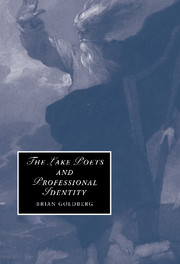Book contents
- Frontmatter
- Contents
- Acknowledgments
- Introduction: Professionalism and the Lake School of Poetry
- Part I Romanticism, risk, and professionalism
- Part II Genealogies of the romantic wanderer
- 2 Merit and reward in 1729
- 3 James Beattie and The Minstrel
- Part III Romantic itinerants
- Part IV The Lake school, professionalism, and the public
- Notes
- Bibliography
- Index
3 - James Beattie and The Minstrel
Published online by Cambridge University Press: 14 January 2010
- Frontmatter
- Contents
- Acknowledgments
- Introduction: Professionalism and the Lake School of Poetry
- Part I Romanticism, risk, and professionalism
- Part II Genealogies of the romantic wanderer
- 2 Merit and reward in 1729
- 3 James Beattie and The Minstrel
- Part III Romantic itinerants
- Part IV The Lake school, professionalism, and the public
- Notes
- Bibliography
- Index
Summary
James Beattie is among the most important late-century precursors of Romantic writing. His The Minstrel (1771, 1773), an autobiographical account of the poet's education in nature, was widely influential, and some measure of its significance may be detected in the identification made by Dorothy Wordsworth: “Beattie's Minstrel always reminds me of [William Wordsworth], and indeed the whole character of Edwin resembles much what William was when first I knew him.” The occasion of Dorothy's comment is revealing, and not much remarked on. Wordsworth has been quarreling with his uncle about his refusal to enter the Church, and the point of Dorothy's comparison is to exonerate Wordsworth on the basis of his “natural disposition,” which is that of Beattie's “strange and wayward wight.” “Disposition” here is a natural inclination toward (and away from) certain kinds of work, and in hindsight Dorothy may be granting too much to her family in her defense of her brother. Wordsworth's Beattiean “waywardness” is not merely a languid resistance to professional labor. For the fictional minstrel and the real Wordsworth both, vocational wandering stands for the desire to reconstitute a new professionalism that saves old arrangements from morbidity and corruption.
Central to this new professionalism is a reconsideration of the making of the individual professional, and like Savage before him and the Lake poets after him, Beattie will suggest that a series of special experiences is required to qualify the poet for his role.
- Type
- Chapter
- Information
- The Lake Poets and Professional Identity , pp. 90 - 122Publisher: Cambridge University PressPrint publication year: 2007



